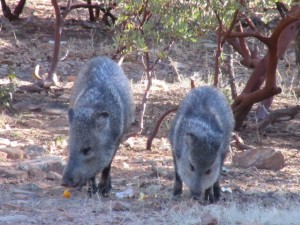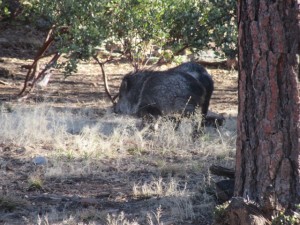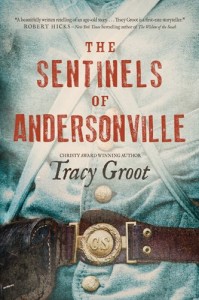Elk and javelina epitomize these rugged Ponderosa forests, the setting for one of my novels, and time spent here makes all the difference in writing.
Today, Tracy Groot shares about visiting the site of your novel.
“Site visits are very important. “The land speaks” even decades or centuries or millennia later. Visits have an orienting effect and always, always, always yield the unexpected: my visits to Andersonville for The Sentinels of Andersonville yielded impromptu interviews with the mayor, a storeowner, a museum curator.
“Visiting a site can infuse your story with small but important details–lovely specificities that round out the tone of many scenes. Also, check out any local museums—they usually have dynamite bookstores.
“My visit to France for Flame of Resistance yielded such a wealth of information, I cannot imagine how the book would’ve turned out without it; I ate the local food in Normandy, visited multiple WWII museums, talked with elderly folk who’d been around during the war. Priceless! And fun! And we’ve learned to combine site visits with family vacations, to save money.”
Did I mention I’ve been working on a World War II series set in Southern France for a looooong time . . . maybe a visit is in order!
Last week we focused on character, so here’s a bit more from Tracy on that. (Can’t you just see character in this scrounger eating food scraps?)
Character always informs story and plot for Tracy. “I love what British historian Arnold Toynbee said, that character results from a person’s heredity and interaction with his environment; so I research where one of my characters is from to develop his or her story and personality. Getting to know the character and realizing how they act or react, helps to inform plot.”
What story does Tracy resonate with most?
“Each book has something that is a part of me—scenes in every one came from the gut—and it’s still a thrill and joy that these scenes actually made it to paper. It’s hard to nail down a favorite—I usually pick the one I’ve last worked on, ha ha! Maggie Bright, a story about the rescue of the British army at Dunkirk, is a current fave. It comes out in May 2015.”
Heartfelt thanks to Tracy for giving us an inside look at her vocation—perhaps readers will get a feel for the commitment she puts into each novel. And writers, she’s given us a wealth of food for thought. Feel free to comment about anything and everything. And be watching for Maggie Bright.
Please include contact information with your comment in order to vie for the prize of Tracy’s The Sentinels of Andersonville. We’ll announce the winner next week and send the copy to you posthaste.




Would love to read this!
I hope you get to, Brenda. Are you a writer?
Great info on site visits—I’m bookmarking this post so that I can refer back to it. I met Tracy very briefly at a writing conference this fall and would love to read The Sentinels of Andersonville!
Thanks so much for visiting, Jen. It’s exciting, since I’ve only recently resurrected this blog. Hope you win!
I like visiting sites just to get the feel. Like you said, “the land speaks.” That being said, I usually invent locations close to home so that I can have the facts straight and the non-facts believable. 🙂
Sounds like a safe choice, Liz! When I’ve invented something at a distance, I’m usually surprised by what I find when I visit.
Thanks for stopping by.
I am very much scene driven in my writing. Locations where I’ve lived or visited and especially from my childhood haunt me until I get them down on paper. Human beings are special for the reason that we alter our habitat, but what I’m most interested in is how our locations change us! Thanks for a great post.
Isn’t THAT the truth?!? I’m about to go for a walk under an incredible Ponderosa Pine forest, and my friend just told me of the dire weather predictions for the NE…what a difference it makes in me to be able to walk outdoors.
I think too, of how isolated certain locations make us feel, or how stymied…at least that’s my experience. Then there’s the freeing that comes with a change of scenery. Now, to translate that into my characters’s experience.
Thanks, Sara.